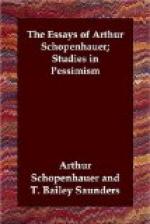And, in general, children should not form their notions of what life is like from the copy before they have learned it from the original, to whatever aspect of it their attention may be directed. Instead, therefore, of hastening to place books, and books alone, in their hands, let them be made acquainted, step by step, with things—with the actual circumstances of human life. And above all let care be taken to bring them to a clear and objective view of the world as it is, to educate them always to derive their ideas directly from real life, and to shape them in conformity with it—not to fetch them from other sources, such as books, fairy tales, or what people say—then to apply them ready-made to real life. For this will mean that their heads are full of wrong notions, and that they will either see things in a false light or try in vain to remodel the world to suit their views, and so enter upon false paths; and that, too, whether they are only constructing theories of life or engaged in the actual business of it. It is incredible how much harm is done when the seeds of wrong notions are laid in the mind in those early years, later on to bear a crop of prejudice; for the subsequent lessons, which are learned from real life in the world have to be devoted mainly to their extirpation. To unlearn the evil was the answer, according to Diogenes Laertius,[1] Antisthenes gave, when he was asked what branch of knowledge was most necessary; and we can see what he meant.
[Footnote 1: vi. 7.]
No child under the age of fifteen should receive instruction in subjects which may possibly be the vehicle of serious error, such as philosophy, religion, or any other branch of knowledge where it is necessary to take large views; because wrong notions imbibed early can seldom be rooted out, and of all the intellectual faculties, judgment is the last to arrive at maturity. The child should give its attention either to subjects where no error is possible at all, such as mathematics, or to those in which there is no particular danger in making a mistake, such as languages, natural science, history and so on. And in general, the branches of knowledge which are to be studied at any period of life should be such as the mind is equal to at that period and can perfectly understand. Childhood and youth form the time for collecting materials, for getting a special and thorough knowledge of the individual and particular things. In those years it is too early to form views on a large scale; and ultimate explanations must be put off to a later date. The faculty of judgment, which cannot come into play without mature experience, should be left to itself; and care should be taken not to anticipate its action by inculcating prejudice, which will paralyze it for ever.




